subject
英语subject是什么中文意思
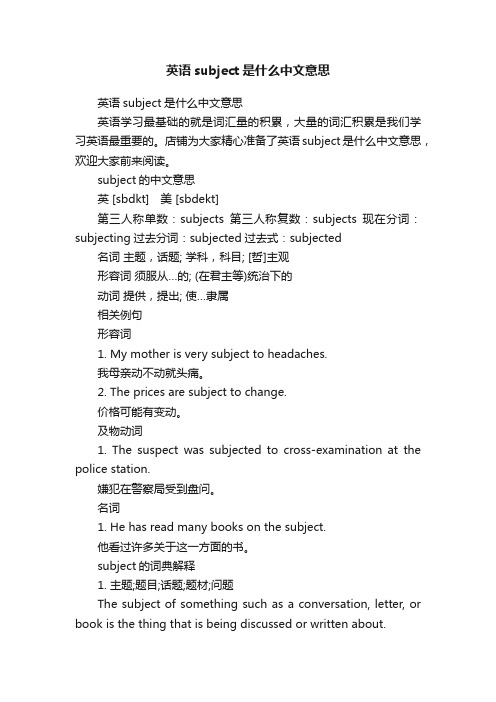
英语subject是什么中文意思英语subject是什么中文意思英语学习最基础的就是词汇量的积累,大量的词汇积累是我们学习英语最重要的。
店铺为大家精心准备了英语subject是什么中文意思,欢迎大家前来阅读。
subject的中文意思英 [sbdkt] 美 [sbdekt]第三人称单数:subjects第三人称复数:subjects现在分词:subjecting过去分词:subjected过去式:subjected名词主题,话题; 学科,科目; [哲]主观形容词须服从…的; (在君主等)统治下的动词提供,提出; 使…隶属相关例句形容词1. My mother is very subject to headaches.我母亲动不动就头痛。
2. The prices are subject to change.价格可能有变动。
及物动词1. The suspect was subjected to cross-examination at the police station.嫌犯在警察局受到盘问。
名词1. He has read many books on the subject.他看过许多关于这一方面的书。
subject的词典解释1. 主题;题目;话题;题材;问题The subject of something such as a conversation, letter, or book is the thing that is being discussed or written about.e.g. It was I who first raised the subject of plastic surgery.是我第一个提到整形手术这个话题的。
e.g. ...the president's own views on the subject.总统在此问题上的个人观点2. (批评、学习、调查的)对象Someone or something that is the subject of criticism, study, or an investigation is being criticized, studied, or investigated.e.g. Over the past few years, some of the positions Mr. Meredith has adopted have made him the subject of criticism...在过去的几年里,梅雷迪思先生所采取的某些立场使他成为了批评的对象。
subject作动词的用法

subject作动词的用法"Subject" can be used as both a verb and a noun in English.As a verb, "subject" means to cause someone or something to experience or undergo a particular action, condition, or treatment. It can also mean to make someone or something susceptible or vulnerable to something. Here are a few example sentences:- The students were subjected to a challenging exam.(学生们经历了一场具有挑战性的考试。
)- The prisoner was subjected to intense questioning.(囚犯受到了严厉的询问。
)- The town was subjected to heavy rainfall.(该镇遭受了大雨的侵袭。
)As a noun, "subject" refers to the person, thing, or topic that a sentence is about. It can also refer to a branch of knowledge or an area of study. Here are a few example sentences: - The main subject of the book is human psychology.(这本书的主题是人类心理学。
)- Mathematics is my favorite subject.(数学是我最喜欢的科目。
高中英语单词天天记subject素材
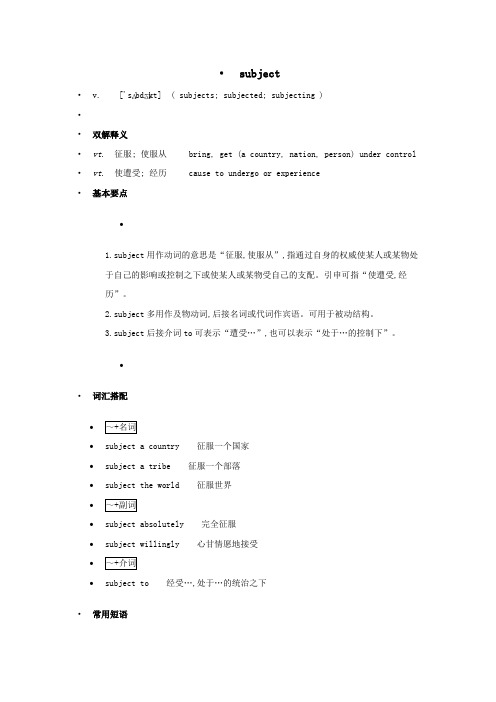
· subject· v. ['sʌbdʒɪkt] ( subjects; subjected; subjecting )·· 双解释义· vt.征服; 使服从bring, get (a country, nation, person) under control · vt.使遭受; 经历cause to undergo or experience· 基本要点•1.subject用作动词的意思是“征服,使服从”,指通过自身的权威使某人或某物处于自己的影响或控制之下或使某人或某物受自己的支配。
引申可指“使遭受,经历”。
2.subject多用作及物动词,后接名词或代词作宾语。
可用于被动结构。
3.subject后接介词to可表示“遭受…”,也可以表示“处于…的控制下”。
•· 词汇搭配••subject a country 征服一个国家•subject a tribe 征服一个部落•subject the world 征服世界••subject absolutely 完全征服•subject willingly 心甘情愿地接受••subject to 经受…,处于…的统治之下· 常用短语•subject to(v.+prep.)〔说明〕 subject to常不用于进行体。
▲subject sb/oneself/sth to sth1.使…经受〔受到〕… make (sb/sth) have (treatment, a test, etc.)His rude behaviour subjects him to frequent rebuffs.他的粗鲁行为使他经常遭受冷遇。
Your conduct subjects you to public ridicule.你的行为使你受到世人的嘲笑。
They subjected their friend to ridicule.他们让自己的朋友受人嘲笑。
subject考研中常考词意
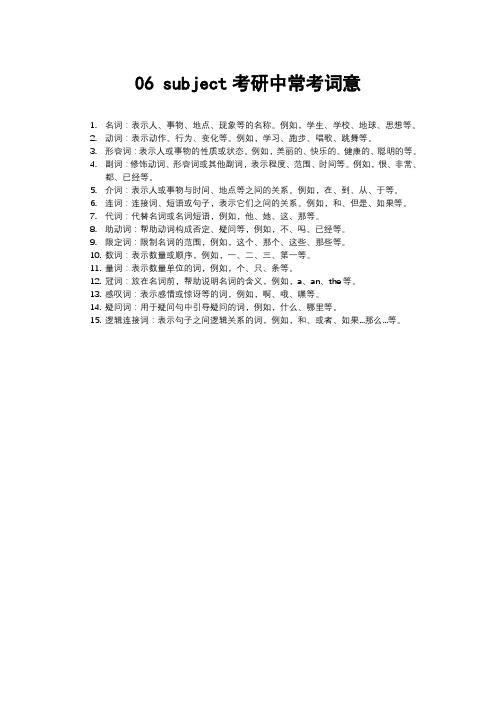
06 subject考研中常考词意
1.名词:表示人、事物、地点、现象等的名称。
例如,学生、学校、地球、思想等。
2.动词:表示动作、行为、变化等。
例如,学习、跑步、唱歌、跳舞等。
3.形容词:表示人或事物的性质或状态。
例如,美丽的、快乐的、健康的、聪明的等。
4.副词:修饰动词、形容词或其他副词,表示程度、范围、时间等。
例如,很、非常、
都、已经等。
5.介词:表示人或事物与时间、地点等之间的关系。
例如,在、到、从、于等。
6.连词:连接词、短语或句子,表示它们之间的关系。
例如,和、但是、如果等。
7.代词:代替名词或名词短语,例如,他、她、这、那等。
8.助动词:帮助动词构成否定、疑问等,例如,不、吗、已经等。
9.限定词:限制名词的范围,例如,这个、那个、这些、那些等。
10.数词:表示数量或顺序,例如,一、二、三、第一等。
11.量词:表示数量单位的词,例如,个、只、条等。
12.冠词:放在名词前,帮助说明名词的含义,例如,a、an、the等。
13.感叹词:表示感情或惊讶等的词,例如,啊、哦、嘿等。
14.疑问词:用于疑问句中引导疑问的词,例如,什么、哪里等。
15.逻辑连接词:表示句子之间逻辑关系的词,例如,和、或者、如果...那么...等。
一.主语:主语(subject)
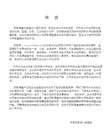
The show is from seven till ten. 演出时间为7点至10点。(介词短语)
10.Is that why you were angry? 这就是你发怒的原因吗?(从句)
11.This is where I first met her. 这就是我初次与她会面的地方。(从句)
3.If you add 5 to 5, you get 10. 5加5等于10。(数词)。
4.I shall do my possible. 我将尽力而为。(名词化形容词)
5.He left there last week. 他上个星期离开了那里。(副词)
6.Does she really mean to leave home? 她真的要离开家吗?(不定式)
有时可以置于主语之后,前后都有逗号,与非限定性定语相似。如:
The man, cruel beyond belief, didn’t listen to their pleadings.
那人不可置疑地残酷,不听取他们的恳求。
(2).可以用做宾语补语的有名词、形容词、不定式、动名词、分词、介词短语等
3.The well ran dry. 这口井干枯了。(short , loose , wild , cold 等)
4.A thin person always seems to be taller than he really is.
一个瘦个子似乎比他的实际高度要高些。
四.宾语
宾语(object)在句中主要充当动作的承受者,因此一般皆置于及物动词之后。如:
7.He never did the unexpected(想不到的,意外的).
高中英语单词天天记subject素材
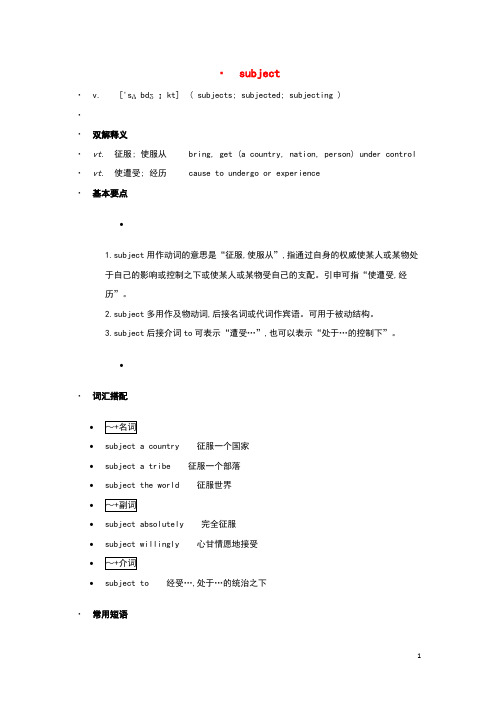
· subject· v. ['sʌbdʒɪkt] ( subjects; subjected; subjecting )·· 双解释义· vt.征服; 使服从bring, get (a country, nation, person) under control · vt.使遭受; 经历cause to undergo or experience· 基本要点•1.subject用作动词的意思是“征服,使服从”,指通过自身的权威使某人或某物处于自己的影响或控制之下或使某人或某物受自己的支配。
引申可指“使遭受,经历”。
2.subject多用作及物动词,后接名词或代词作宾语。
可用于被动结构。
3.subject后接介词to可表示“遭受…”,也可以表示“处于…的控制下”。
•· 词汇搭配••subject a country 征服一个国家•subject a tribe 征服一个部落•subject the world 征服世界••subject absolutely 完全征服•subject willingly 心甘情愿地接受••subject to 经受…,处于…的统治之下· 常用短语•subject to(v.+prep.)〔说明〕 subject to常不用于进行体。
▲subject sb/oneself/sth to sth1.使…经受〔受到〕… make (sb/sth) have (treatment, a test, etc.)His rude behaviour subjects him to frequent rebuffs.他的粗鲁行为使他经常遭受冷遇。
Your conduct subjects you to public ridicule.你的行为使你受到世人的嘲笑。
They subjected their friend to ridicule.他们让自己的朋友受人嘲笑。
subject词根
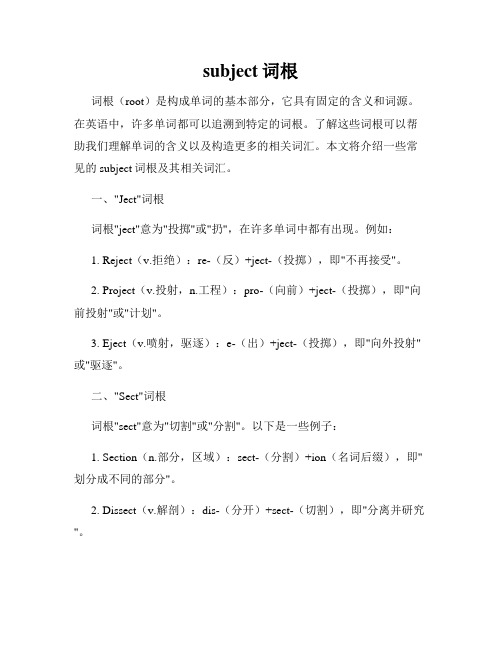
subject词根词根(root)是构成单词的基本部分,它具有固定的含义和词源。
在英语中,许多单词都可以追溯到特定的词根。
了解这些词根可以帮助我们理解单词的含义以及构造更多的相关词汇。
本文将介绍一些常见的subject词根及其相关词汇。
一、"Ject"词根词根"ject"意为"投掷"或"扔",在许多单词中都有出现。
例如:1. Reject(v.拒绝):re-(反)+ject-(投掷),即"不再接受"。
2. Project(v.投射,n.工程):pro-(向前)+ject-(投掷),即"向前投射"或"计划"。
3. Eject(v.喷射,驱逐):e-(出)+ject-(投掷),即"向外投射"或"驱逐"。
二、"Sect"词根词根"sect"意为"切割"或"分割"。
以下是一些例子:1. Section(n.部分,区域):sect-(分割)+ion(名词后缀),即"划分成不同的部分"。
2. Dissect(v.解剖):dis-(分开)+sect-(切割),即"分离并研究"。
3. Intersection(n.交叉点):inter-(相互)+sect-(切割),即"两个部分相交的地方"。
三、"Subject"词根词根"subject"意为"主题"或"受制于"。
以下是几个例子:1. Subject(n.主题,学科):sub-(下)+ject-(扔),即"在主题或学科下"。
2. Subjective(adj.主观的):sub-(下)+jective-(形容词后缀),即"受个人主观判断影响的"。
subject

subjectSubject ⽤法由于英语和汉语属于不同的语系,其构词法有着巨⼤的区别,导致词汇的意思各不相同,甚⾄⼤相径庭。
有些英语词汇看似简单,但在不同的语境下有着不同的语义。
这给英语学习者正确理解、把握和运⽤英语词汇带来了不⼩的困难。
英语短语subject to就是这样⼀个例⼦。
⾸先将subject 和to 单独理解,subject的主要和常⽤意思是:1. As a noun, a person owing loyalty to a certain state or royal ruler: a subject of the United Kingdom.作名词,指对某个国家或统治者表⽰忠诚的⼈,⽤常⽤汉语表述为“⾂民、国民”;如:英国国民。
2. As a noun, something being considered, as in a conversation: Don’t change the subject; answer the question.作名词,指如在⼀个谈话中正在讨论、考虑的东西,汉语表述为“话题、主题、论题”;如:不要改变话题,回答这个问题。
从翻译的⾓度来讲,这句话可以⽤更好的中⽂表述:不要东拉西扯,回答这个问题;不要罔顾左右⽽⾔它,回答这个问题。
3. As a noun, a branch of knowledge studied, as in a system of education: she’s taking 3 subjects in her examinations.作名词,所学知识的⼀个分⽀,如在教育系统中的学科,汉语表述为“科⽬、学科”:她在参加三门学科的考试。
4. As a noun, a cause: his strange cloth was a subject for amusement.作名词,(事情的)起因,汉语表述为“起因、原因、缘由”:他奇怪的服饰是⼤家取笑的原因(直译);他奇怪的服饰成了⼤家的笑料。
- 1、下载文档前请自行甄别文档内容的完整性,平台不提供额外的编辑、内容补充、找答案等附加服务。
- 2、"仅部分预览"的文档,不可在线预览部分如存在完整性等问题,可反馈申请退款(可完整预览的文档不适用该条件!)。
- 3、如文档侵犯您的权益,请联系客服反馈,我们会尽快为您处理(人工客服工作时间:9:00-18:30)。
Subject 用法由于英语和汉语属于不同的语系,其构词法有着巨大的区别,导致词汇的意思各不相同,甚至大相径庭。
有些英语词汇看似简单,但在不同的语境下有着不同的语义。
这给英语学习者正确理解、把握和运用英语词汇带来了不小的困难。
英语短语subject to就是这样一个例子。
首先将subject 和to 单独理解,subject的主要和常用意思是:1. As a noun, a person owing loyalty to a certain state or royal ruler: a subject of the United Kingdom.作名词,指对某个国家或统治者表示忠诚的人,用常用汉语表述为“臣民、国民”;如:英国国民。
2. As a noun, something being considered, as in a conversation: Don’t change the subject; answer the question.作名词,指如在一个谈话中正在讨论、考虑的东西,汉语表述为“话题、主题、论题”;如:不要改变话题,回答这个问题。
从翻译的角度来讲,这句话可以用更好的中文表述:不要东拉西扯,回答这个问题;不要罔顾左右而言它,回答这个问题。
3. As a noun, a branch of knowledge studied, as in a system of education: she’s taking 3 subjects in her examinations.作名词,所学知识的一个分支,如在教育系统中的学科,汉语表述为“科目、学科”:她在参加三门学科的考试。
4. As a noun, a cause: his strange cloth was a subject for amusement.作名词,(事情的)起因,汉语表述为“起因、原因、缘由”:他奇怪的服饰是大家取笑的原因(直译);他奇怪的服饰成了大家的笑料。
5. As a noun, the main area of interest treated in a work, esp. written: a book on the subject of love.作名词,著作中的主题思想,尤其是在书面作品中,汉语表述“主题、主体、题材”:一本以爱情为主题的书。
6. As an adjectiv e, governed by some one else; not independent: a subject race.作形容词,(被)统治的,不独立的;汉语表述为“隶属的、统治的、管辖的、服从的”:一个隶属民族。
7. As a verb, to cause to be controlled or ruled: These people have been subjected by another tribe.作动词,被统治、控制;汉语表述为“统治、控制”:这些人被另外一个部落统治着。
我们都知道“to”在英语中都作介词使用,主要意思是:向、去、到、达到、比、对、在等等。
当subject 和to连用,构成短语subject to,其意思发生了很大变化,尤其是和它的名词形式。
因而Subject to是英语中一个很常见、很重要但很难把握的短语。
特别是在商务合同、法律和税收等中出现的频率很高,不少人由于没有真正了解它的用法,而不能正确理解、翻译和使用它。
下面谈谈subject to的用法:一、作形容词用1.基本含义是“应服从……的……”、“受制于……”。
英语解释:owing obedience to, 示例:All the foreigner friends are subject to the law of our country.所有外国朋友都应服从我们国家法律。
2.基本含义是“有……倾向”、“易受……”。
英语解释为:prone to,vulnerable to。
Wenchuan and Qingchuan counties in Sichuan province are subject to earthquakes as they are located on Longmenshan Earthquake Zone.四川省的汶川和青川县易受地震的影响,因为它们位于龙门山地震带上。
A weak man is subject to cold.体质不好的人易感冒。
Rates of Exchange is often subject to fluctuation.汇率总是在波动。
3.基本含义“按照……”,“须经……”英语解释:conditional upon。
示例:Your payment is subject to following alteration:20% discount for the total value.贵方付款须按如下更改:即总价基础上优惠20%。
二、作副词用,意思是“在……条件下”,“依照……”;英语解释:conditionally upon。
示例:This contract can only be signed subject to the President’s consent.本合同须经总裁同意后方能签署。
Subject to 作副词,作条件状语。
三、作动词用:subject……to……1. 基本意思是“使服从于……”,“使隶属于……”。
英语解释:bring or get a country, nation, person etc. under control. 示例:Ancient Rome subjected most of Europe to her rule.古罗马征服了大半个欧洲。
2. 基本意思是“使遭受”、“使经历”。
英语解释:cause to undergo or experience;expose。
示例:③We must subject all the applications to careful scrutiny.(直译:我们必须使所有申请遭受严格的审查)我们必须对所有的申请进行仔细的审查。
总之,subject to可作形容词、副词、动词词组来使用,to 是介词,sub-在英语中有较强的“在……下面”,“附属”,“次于”的意思,明白这些,我们就很容易掌握并运用它了。
四.有关含subject to疑难句子的理解。
1. If someone or something is subject to something, especially something bad, it is possible or likely that they will be affected by it.如果某人或者某物受某些事物支配,尤其是不好的事物,可能那些从属物会受到它的影响(它指上面的从属于后的事物)2. If something is subject to something such as approval, it depends on that thing happening before it can happen如果某些事物从属于另外一些事物,比如“获得批准”,它必须依赖于它发生前那件事是可以发生的。
e.g. The package of plan is subject to approval by the Board of Directors.这一揽子计划须经董事会批准。
3. If you are subject to a rule, law, tax,penalty etc, you must obey the rule or pay an amount of money.如果你需服从规章、法律、税、处罚等,你一定要遵守规则或者付一定数量的钱。
4. Room rates are subject to 10% service charge with one breakfast per room per night。
每房每晚的房费须加收10%的服务费和早餐费。
本句话是酒店英语中常见可不好理解的。
Be subjected to 在这里理解为“附加收取”。
5. This documentary credit is subject to the Uniform Customs and Practice for Documentary Credits (1993 Revision) International Chamber of Commerce (publication No. 500).译文:本跟单信用证受国际商会《跟单信用证统一惯例》(1993 年修订本) 约束(出版编号:500)。
本句话中的subject to 在跟单信用证证中意为“受……约束,受……管制”。
此条款在国际付款中是最常见的、模板化的条款。
商务英语学习者必须对类似的条款进行收集、整理以提高工作效率。
6. Further project terms, procedures, and conditions are subject to contract negotiation and shall be agreed prior to award of order.译文:项目的别的条款、程序和条件须按照合同谈判商定并在发出订单前达成共识。
这是一份报价书里的句子。
由于报价书篇幅所限,报价方只对重要的条款如供货范围、价格、交货时间、付款条款等作了说明,而将别的项目用本句子约定。
这里subject to 理解为“按照……”。
7. The buyer shall keep confidential the basic design, know-how, technicaldocumentation and technical information supplied by the seller from any third party except those who are actually engaged in the performance of planning, erection and operation of the contract plant, however, they shall be subject to the same secrecy.译文:买方须对由卖方提供的基础设计、专有技术、技术文件和技术信息保密,不得泄露给任何第三方,除非他们实际从事合同工厂计划、安装和操作的具体工作,但是,他们仍须受本条款的约束。
从上述有关subject 和subject to的实际例句中,可以看到subject to和subject的形容词和动词有较大的关系,而和它的名词联系不大。
